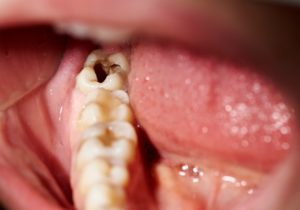The Complete Guide To Cavities: What Are They And How Can You Avoid Them?
December 15, 2019
 According to the Center for Disease Control and Prevention, about 96 percent of adults between the ages of 20 and 64 have had a cavity at some point during their life. It’s one of the most common dental diseases and has impacted nearly every adult. The best way to prevent them and keep your mouth healthy is to learn what they are, how they form, and what you can do at home to keep them from developing. Read below to learn everything you need to know about cavities from your dentist in DeLand so you can avoid them.
According to the Center for Disease Control and Prevention, about 96 percent of adults between the ages of 20 and 64 have had a cavity at some point during their life. It’s one of the most common dental diseases and has impacted nearly every adult. The best way to prevent them and keep your mouth healthy is to learn what they are, how they form, and what you can do at home to keep them from developing. Read below to learn everything you need to know about cavities from your dentist in DeLand so you can avoid them.
What are Cavities?
Considering how common cavities are, many people aren’t sure exactly what they are and how they form, they’re just told that they have one. Cavities and tooth decay are both considered diseases, and they’re caused by specific oral bacteria that produce acid that destroys enamel. Some people have a history of frequent cavities because their teeth are more vulnerable. This includes people that have dental work, large crevices in the surface of their molars that trap sugar, and gum disease.
Decay typically forms in the deep pits and grooves of the molars that are responsible for chewing and breaking apart food when you eat. These catch carbohydrates and sugar, creating an ideal environment for harmful oral bacteria that produce enamel-eroding acid to thrive in. Cavities can also develop between the teeth, near the gum line, and around dental restorations, because these areas are all difficult to thoroughly clean at home.
How Do Cavities Form?
The accumulation of harmful oral bacteria that releases acid that attacks dental enamel is the primary cause of cavity formation. These bacteria are able to accumulate for a variety of reasons, including excessive sugar and carbohydrate intake as well as poor dental hygiene.
Each time you consume sugar and starches, the bacteria feeds off of the substances and release acid and toxins as waste. These stick to your teeth and gums in the form of plaque and tartar, slowly eroding your tooth from the outside in, eventually carving a path towards the inner chamber that houses the pulp. Without proper oral hygiene and a conscious diet, these bacteria can eventually cause severe cavities that lead to infections of the sensitive pulp.
How Can You Prevent Cavities?
The best way to control plaque and food debris buildup is to have a thorough and effective oral hygiene routine. Each day, you should brush your teeth at least twice, floss once, and rinse with antibacterial mouthwash at least once. This will make it hard for harmful oral bacteria to survive and cause enamel erosion that leaves your teeth vulnerable. It’s also important to visit your dentist in DeLand every six months for checkups and cleanings to remove tartar and clean the hard-to-reach nooks and crannies of your mouth. Another tip for preventing cavities is to maintain a nutritious and balanced diet by limiting your intake of sugar and starch.
With these preventive measures in place, your routine appointments with your dentist will be shorter and easier, because you won’t need any fillings! If you have any questions about how you can keep your mouth as healthy as possible, be sure to ask your dentist during your next visit.
About the Author
Dr. Christopher Cowell has been practicing dentistry for over 23 years. He focuses on building strong and long-lasting relationships with his patients so he can provide them with the highest quality of individualized care possible. He focuses on preventive dentistry that keeps small oral health problems from having an opportunity to develop into more severe issues down the road. He’s also an active member of several professional organizations, including the American Dental Association and International College of Dentists. For questions or to schedule a routine checkup and cleaning, visit his website or call 386-734-8585.
No Comments
No comments yet.
RSS feed for comments on this post.
Sorry, the comment form is closed at this time.

